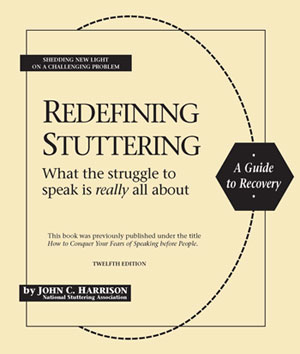Stuttering
Answers
all your speech dysfluency
questions answered
on one site
Stuttering Child Answers
In this section we refer to a child (as opposed to a toddler) as being in the age group from 6 - 12. Typically the child began to stutter in the 2 - 5 year age group and they either have not as yet grown out of the speaking behaviour themselves, as is the case with 80% of children who start to stutter, or, they have received some form of speech therapy and have not fully responded to it. As mentioned, research has determined that about 80% of children will spontaneously recover from their stuttering behaviour before the age of 12 years old but most will recover in the first 12 - 24 months of the onset. That is the good news however one must not sit back and assume that their child will spontaneously recover before the age of 12. This is particularly so where either parent has a history of stuttering somewhere in the family as research has also shown that stuttering runs in families. If your child is stuttering beyond the age of 5 -6 then you are well advised to seek out a professional assessment from a speech pathologist with a good level of experience (and success) in the treatment of children that stutter. As mentioned in the section on "toddlers", treatment of children who stutter may start in the speech pathologists clinic but it is carried out, and hopefully ends, in the family environment. What is meant by this is that although the stuttering begins as a result of excess demands being placed on the child for speech performance compared to what the brain can handle at that time, it can most often exacerbated by the environment that the child, who is more often than not highly sensitive, is experiencing in daily life both at home and at school. Stuttering, it can be argued, while starting as a neurological deficit can become a habit that can be triggered in stressful and anxious situations especially where the child has to perform orally like reading in school. It is therefore a good idea, as an adjunct to a level of speech pathology to help the child improve their self confidence and self esteem and to increase their skills in public speaking situations in a controlled and non threatening environment. It would benefit any child, not only a child that stutters, to part take in any group activity or sport that they are able to excel at some directing a child in that area will always help their self esteem and self concept. For a child who has a stuttering problem it would help to direct them into some form of drama or acting while they are young to improve their skills of speaking and performing in front of an audience before they start to develop fears in that area. It also helps to encourage the child to read aloud at home in a calm and none threatening environment. Similarly encouraging the child to give a little verbal presentation at home will always help to engender a confidence in them in speaking. These should start out as a fun and simple exercise to start with and gradually get a little harder without at any time reaching a point where the child develops any fear of the situation. Having fun is always the order of the day and if mum and dad and the other children can join in then the emphasis is not so much on the child. The child should always be praised for good fluent speech and the child should always be encouraged to have another attempt at stuttered or "bumpy speech". Having said that, at no time do we ever want the child to start to believe that "dysfluent speech" is wrong, weird or unacceptable only that it is more desirable to try to eliminate it. Fluent none stuttered speech is more desire able rather than stuttered speech is bad. If the home environment can be made to be less demanding on the child as far as stress, anxiety and even fear then there is a good chance that the child will gain a good level of speech fluency if not total fluency. This will also be facilitated if the parents are able to slow and prolong their own speech when talking to the child whenever possible. Finally, it is always helpful for the child to take part in youth groups or camps for kids who stutter so that they are able to see that "they are not alone" in having a stutter. In that regard you should contact the stuttering support group in your country to see if such groups are available. If they are not then maybe you might want to get together with your local speech pathologist to organise such a group. If you have any questions you would like answered or have any suggestions of what should be covered in this section, please email info@stuttering-answers.com
|
Stuttering Facts
Stuttering Advice
Stuttering Treatment Centres
Stuttering Treatments
Useful Articles Books, Audio & Video
Videos About Stuttering
Stuttering Support Groups
Stuttering News Articles
Stuttering Research
Discussion Forums
Conferences & Events
|
Copyright (c) 2011 - All Right Reserved - Stuttering Answers

